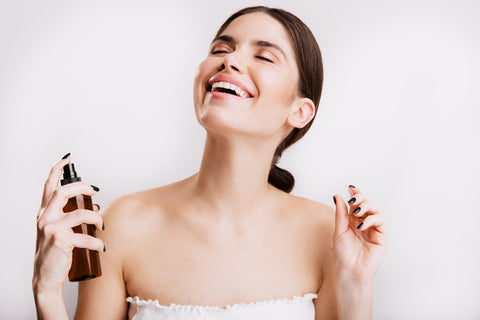What Are The Health Benefits Of Perfume?
The art of perfume-making stretches back millennia, with civilizations around the world using scented oils and fragrances for religious ceremonies, social distinction, and even medicinal purposes. Today, there's a renewed focus on the powerful link between scent and well-being. While aromatherapy uses essential oils for targeted therapeutic benefits, perfume offers a more holistic approach. By harnessing the emotional and psychological power of fragrance, perfume can elevate our mood, boost confidence, and promote relaxation, contributing to a greater sense of overall well-being. However, it's important to remember that perfume is not a cure-all, but rather a tool that can complement a healthy lifestyle.

Potential Psychological Benefits of Perfume
Mood Enhancement
- The Science of Scents and Emotions: Our sense of smell is intricately linked to the limbic system, the brain's emotional center. When we inhale a scent, odorant molecules travel to olfactory receptors in the nose, sending signals to the limbic system that trigger emotional responses.
- Uplifting Scents: Citrus scents like lemon, grapefruit, and bergamot are widely known for their mood-boosting properties. These bright, invigorating aromas can stimulate the release of neurotransmitters like dopamine and serotonin, promoting feelings of happiness, alertness, and energy. Studies have shown that citrus scents can be particularly helpful in combating fatigue and improving cognitive function.
- Calming Scents: Floral scents like lavender, chamomile, and rose have a calming and relaxing effect. These scents can activate the parasympathetic nervous system, promoting a sense of peace and tranquility. Lavender, in particular, has been shown to reduce stress hormones like cortisol and anxiety symptoms.
- Avoiding Olfactory Fatigue: Our olfactory receptors can become desensitized to a scent if we're exposed to it for too long. This phenomenon is called olfactory fatigue. To avoid it and maintain the mood-enhancing benefits of perfume, try not to over-apply it and consider switching up your scents throughout the day or week.
Stress and Anxiety Reduction
- The Power of Calming Scents: Scents like lavender, chamomile, and sandalwood have been used for centuries in aromatherapy practices to promote relaxation and reduce stress. Studies have shown that inhaling these scents can lower blood pressure, slow heart rate, and ease muscle tension, all of which contribute to a feeling of calmness.
- Aromatherapy and Relaxation Techniques: Aromatherapy involves using essential oils, the concentrated essence of plants, for therapeutic purposes. Inhaling essential oils directly or diffusing them into the air can be a powerful way to experience the stress-reducing benefits of scent. Aromatherapy is often used alongside other relaxation techniques like meditation and deep breathing.
- Research and Limitations: While studies suggest the potential of aromatherapy and specific scents for stress and anxiety reduction, more research is needed to determine the specific effectiveness of perfume for this purpose. The concentration of essential oils in perfumes can vary greatly, and the individual response to scents can be subjective.
Confidence Boost
- Scent and Self-Perception: Feeling good about how we smell can have a significant impact on our confidence. When we wear a perfume we enjoy, it can elevate our self-perception and project a sense of self-assuredness. This positive self-image can translate to increased confidence in social interactions and professional settings.
- Signature Scents and Identity: A signature scent is a perfume that becomes associated with an individual. It can become a part of our personal brand and a way to express our unique style and personality. Choosing a signature scent that we feel confident and comfortable in can contribute to a strong sense of self-identity.
- Masking Body Odor and Social Confidence: While not the primary focus of perfume use, masking body odor with a pleasant scent can certainly contribute to social confidence. Feeling fresh and clean can help us feel more comfortable in social situations and reduce self-consciousness.
The Power of Scent and the Brain
Unlike other senses, smell has a unique and powerful connection to our emotions and memories. This connection is due to the fascinating interplay between the olfactory system, located in the back of our nasal cavity, and the limbic system, a group of structures deep within the brain responsible for our emotions, memories, and motivation.

The Olfactory System: Our Gateway to Scent Perception
- Odorant Molecules and Olfactory Receptors: Our olfactory journey begins with the inhalation of air containing odorant molecules, which are tiny particles carrying the scent of a substance.
- Detection by Olfactory Receptors: High up in the nasal cavity lies a specialized olfactory epithelium containing millions of olfactory receptors. These receptors act like tiny keys with specific shapes that can only bind to certain odorant molecules.
- Sending the Signal: When a specific odorant molecule encounters its corresponding receptor, a signal is triggered within the receptor cell.
- The Olfactory Nerve: Bypassing the Thalamus: Unlike other sensory information that travels through the thalamus (a relay center in the brain), olfactory signals take a more direct route. The signal from the activated receptor travels up a nerve called the olfactory nerve directly to the limbic system. This unique pathway is why scents can have such a powerful and immediate impact on our emotions and memories.
The Limic System: Where Scent Meets Emotion and Memory
The limbic system comprises several key structures, including:
- Amygdala: This region processes emotions like fear, pleasure, and anger. When an odorant molecule triggers a signal in the olfactory system and reaches the amygdala, it can evoke a specific emotional response.
- Hippocampus: This area plays a crucial role in memory formation. Scents can trigger vivid memories because the olfactory system has direct connections to the hippocampus. The emotional link created when a scent is first experienced can become associated with the memory, making it even more powerful when triggered by the scent again.
Emotional Response Hierarchy and the Power of Positive Scents
The concept of emotional response hierarchy suggests that certain scents can evoke a predictable range of emotions depending on their perceived pleasantness. For example:
- Pleasant Scents and Positive Emotions: The scent of freshly baked cookies might trigger feelings of comfort and happiness, as the amygdala interprets the scent as positive and rewarding.
- Unpleasant Scents and Negative Emotions: The smell of garbage might evoke feelings of disgust, as the amygdala interprets the scent as unpleasant and potentially harmful.
Perfumes formulated with pleasant scents can activate this emotional response hierarchy, promoting positive feelings like relaxation, confidence, and alertness. The specific emotions evoked will depend on the individual's past experiences and the cultural associations linked to the scent.
Olfactory Receptors: Decoding the Language of Scent
Our ability to perceive a vast array of smells is thanks to the millions of olfactory receptors present in our nasal cavity. These receptors come in hundreds of different types, each with a unique shape. This allows them to recognize and bind to specific odorant molecules.
- A Symphony of Smells: When we smell a complex perfume, it's not just one molecule triggering a single receptor. Multiple odorant molecules interact with various olfactory receptors, creating a complex signal sent to the brain.
- The Role of Concentration: The concentration of odorant molecules can also influence scent perception. Higher concentrations will activate more receptors, leading to a stronger and more distinct scent experience.
By understanding the intricate connection between the olfactory system, the limbic system, and the role of olfactory receptors, we can appreciate how scents have the power to influence our emotions, memories, and overall well-being.

Other Considerations When Using Perfume for Well-being
Individual Preferences
- Finding Your Fragrance Fingerprint: When choosing a perfume for its psychological benefits, prioritizing personal preference is paramount. There's no "one size fits all" approach. What relaxes one person might energize another. Explore different fragrance families (floral, citrus, oriental, etc.) and experiment with various scents to discover what evokes the desired emotional response and resonates with your individual taste.
- The Power of Cultural Context: Our cultural background plays a significant role in how we perceive scents. Certain aromas may have positive connotations in one culture but negative ones in another. Understanding these cultural associations can help you choose a perfume that will be well-received in various social settings. For example, the scent of oud, a resinous wood commonly used in Middle Eastern perfumes, is considered luxurious and sophisticated in some cultures, while others might find it overpowering.
- Memories and Olfactory Associations: Scents have a powerful ability to trigger memories and emotions. A particular perfume may remind you of a childhood vacation, a cherished loved one, or a special event. These personal associations can enhance the emotional impact of a perfume. However, be mindful that certain scents can also trigger negative memories. If a perfume evokes unpleasant memories, it's best to avoid it.
Concentration and Quality
- Understanding Fragrance Strength: Perfumes come in various concentrations, each offering a different intensity and longevity of scent. The higher the concentration of perfume oil, the stronger and longer-lasting the fragrance will be. Here's a breakdown of some common types:
- Eau de Toilette (EDT): The lightest concentration, typically lasting 2-4 hours. Perfect for a refreshing daytime scent or layering with other lighter fragrances.
- Eau de Parfum (EDP): A more concentrated option, lasting 4-8 hours. This is a popular choice for everyday wear as it offers a good balance of scent strength and longevity.
- Parfum (Extrait de Parfum): The highest concentration, offering the most intense and long-lasting scent (8+ hours). Best for special occasions or those who prefer a statement fragrance.
- Natural Perfumes vs. Synthetic Scents:
-
Natural Perfumes: These perfumes are formulated using essential oils extracted from plants, flowers, and other natural sources. They are often considered more luxurious and therapeutic due to the potential benefits of aromatherapy. However, natural perfumes can be more expensive and may have a shorter shelf life.
- Synthetic Scents: Synthetic fragrances are created by perfumers in laboratories. They offer a wider variety of scent profiles and are generally more affordable than natural perfumes. While some may express concerns about potential health risks of synthetic ingredients, reputable fragrance houses adhere to strict safety regulations.
Allergies and Sensitivities
- Patch Testing for Peace of Mind: Before regularly wearing a new perfume, it's crucial to perform a patch test. Apply a small amount of the perfume to a clean area of your inner arm and wait 24-48 hours to see if there's any redness, itching, or irritation. Discontinue use if you experience any discomfort.
- Hypoallergenic and Fragrance-Free Options: For those with allergies or sensitivities, there are hypoallergenic perfumes formulated with fragrance ingredients less likely to cause irritation. These perfumes often contain synthetic fragrance molecules specifically chosen for their low allergenic potential. Additionally, fragrance-free products are available for those who prefer to avoid all scented products.
Additional Considerations:
- Sustainability and Ethical Sourcing: As consumers become more conscious of ethical practices, the responsible sourcing of perfume ingredients is gaining importance. Look for brands committed to using sustainably harvested natural ingredients and avoiding ingredients derived from endangered plants.
- Cruelty-Free Perfumes: Many consumers choose cruelty-free perfumes that avoid animal testing or exploitation during the development and production process. Look for brands certified by organizations like PETA (People for the Ethical Treatment of Animals) or Leaping Bunny to ensure your fragrance choices align with your ethical values.

Creating a Well-Being Routine with Perfume
Perfume can be more than just a pleasant scent; it can be a powerful tool for creating personalized rituals that enhance your well-being. Here are some tips for incorporating perfume into your self-care routine:
- Scent-Scaping Your Day: Just as you might create a calming bedtime environment with soft lighting and soothing music, you can use perfume to set the mood for different parts of your day. Here are some suggestions for associating scents with desired states of mind:
- Morning Motivation: Start your day with a burst of invigorating energy by applying a citrus scent like grapefruit, lemon, or bergamot. These uplifting scents can stimulate the senses and promote feelings of alertness and focus.
- Calming Workday Ritual: If you find yourself feeling stressed during the workday, create a mini self-care moment by applying a calming scent like lavender, chamomile, or sandalwood. Reapplying a light mist of these scents throughout the day can help you maintain a sense of peace and focus.
- Stress-Relieving Evening: After a long day, unwind with a relaxing nighttime ritual. Apply a sleep-promoting scent like lavender, vanilla, or clary sage before bed. These scents can ease anxiety, promote relaxation, and prepare your mind and body for restful sleep.
- The Power of Positive Association: Create positive associations with specific scents by pairing them with activities you enjoy. For example, if you love going for a morning jog, spritz on a favorite citrus scent to energize your workout. Or, if you find reading before bed relaxing, pair that ritual with a calming lavender scent to further enhance the experience. Over time, these scent associations can become powerful triggers for positive emotions and desired states of mind.
- Mindful Smelling for Relaxation: Mindful smelling is a practice that involves focusing your complete attention on the scent of your perfume. Take a deep breath through your nose, allowing the fragrance to fill your senses. Notice the different notes of the perfume and how they evolve over time. This practice can help you become more present in the moment, reduce stress, and promote feelings of calmness.
- Layering Scents for the Fragrance Enthusiast: If you're an experienced perfume user, experimenting with scent layering can be a fun way to create a unique and personalized fragrance experience. Layering involves applying two or more complementary perfumes to create a new, multifaceted scent. Here are some tips for successful layering:
- Start Light: Begin with a light application of each perfume. You can always add more, but it's difficult to take away once applied.
- Consider the Notes: Choose perfumes with complementary notes. For example, a citrus scent might layer well with a floral scent, while a woody scent might complement a spicy scent. Experiment and find combinations that resonate with you.
- Focus on Similar Concentration Levels: Layering perfumes with similar fragrance strengths will ensure a more balanced overall scent.
By incorporating these tips, you can transform perfume from a simple fragrance into a powerful tool for enhancing your well-being and creating a personalized approach to self-care.
Conclusion
By harnessing the unique connection between scent and emotion, perfume can offer a range of psychological and emotional benefits. From boosting mood and confidence to promoting relaxation and reducing stress, perfume can be a powerful tool for enhancing well-being. However, it's important to remember that perfume is a complement, not a replacement, for healthy habits and stress management techniques. Exploring different scents and incorporating them into a self-care routine allows you to discover what works best to elevate your overall sense of well-being.

